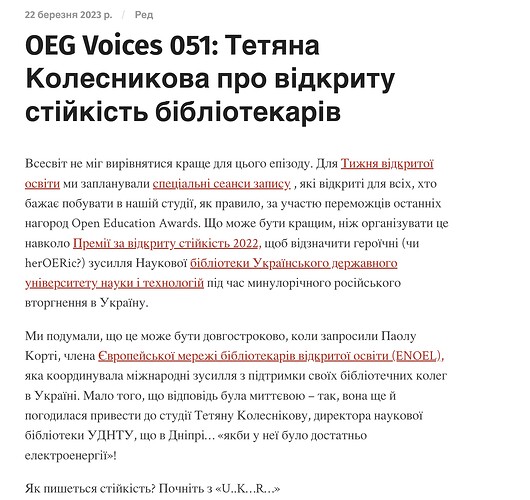Originally published at: OEG Voices 051: Tetiana Kolesnykova on the Open Resilience of Librarians – OEGlobal Voices
The universe could not have aligned better for this episode. For Open Education Week, we schedule special recording sessions that are open to anyone interested in being in the studio with us, usually featuring winners of the most recent Open Education Awards. What could be better than organizing one around the 2022 Award for Open Resilience recognizing the heroic (or herOERic?) efforts of the Scientific Library of the Ukrainian State University of Science and Technologies during last year’s Russian invasion of the Ukraine. We thought it might be a long shot when we invited Paola Corti, one of the European…
I cannot say enough what an inspirational session this was to hear Tetiana’s story in her own words. Please listen to this podcast and share your thoughts below. There was so much to quote (see the transcript).
And I forgot that in January I added a Google Translate feature to the OEG Voices site (see the top menu) where the text of the post is available in Ukrainian
And just because we can, there is now a version of the podcast transcript available that was translated into Ukrainian with Google Translate.
This again would have never been possible without the translation feat by @Mira
When I listened to this podcast, I was profoundly moved. This is an incredible story and it was amazing to hear the story in Tetiana’s own voice before the translation. Thank you for this Alan!
I was especially struck by how she talked about the ways in which crisis moved others in her institution towards sharing their work openly, when before they were reticent to do so. It is interesting to think about this. In some ways, being able to close our work to others is an indication of privilege that we might not even know we have. It gets me wondering that when we consider that we are all in crisis on a global scale - climate crisis, social injustices around the world, etc. - how can we leverage open education, open science, open access directly towards addressing crisis in every moment that we do our work?
That was quite an experience to be there in the studio.
I loved Tetiana’s commitment and resourcefulness. Her willingness to share how hard life currently is in war and her hope.
I was struck by her comment that war has accelerated openness in the Ukraine. I found that curious as similar things are said about the pandemic. Why do we need crises and war to accelerate openness? What is it about open that enlivens life in those contexts making the seemingly impossible possible?
